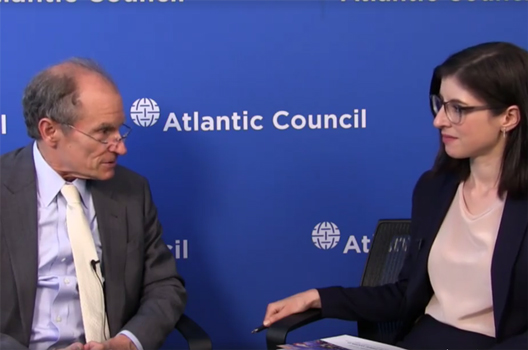 As people in Europe and the United States express their growing skepticism of the value of international cooperation, the notion of a “liberal world order,” or the “free world,” is at risk of dissolving, according to Daniel Fried, a distinguished fellow at the Atlantic Council’s Future Europe Initiative and Dinu Patriciu Eurasia Center.
As people in Europe and the United States express their growing skepticism of the value of international cooperation, the notion of a “liberal world order,” or the “free world,” is at risk of dissolving, according to Daniel Fried, a distinguished fellow at the Atlantic Council’s Future Europe Initiative and Dinu Patriciu Eurasia Center.
Fried joined Alina Polyakova, director of research for Europe and Eurasia at the Atlantic Council, for a Facebook Live interview on June 6 to explain the importance of securing today’s international order against a number of social, political, and economic threats. Fried’s new report, The Free World, calls for US re-engagement with allies under stronger, value-based leadership, an approach which is not sacrificial and will ultimately benefit the United States.
Fried, whose forty-year foreign service career included the role of senior director of the National Security Council under Presidents Bill Clinton and George W. Bush, stressed the importance of reminding citizens “who we are and what the free world has done for America.” Considering the threats Russian President Vladimir Putin poses to democratic countries, Fried said cooperation among allies is essential, now more than ever. “Our security, our prosperity, depends on the prosperity and security of others,” he said.
According to Fried, the notion of the free world has become fractured by a series of divisive issues. First and foremost, he said, is economics, specifically the stagnation of economic growth in Europe and high levels of income disparity in the United States. Second, he identified an unhealthy nationalism that has further fractured the United States. Recently, he said, the United States has not “given enough space for honest, democratic patriotism… Instead, we have people who are chauvinistic, who wave the American flag not as a sign of unity, but as a sign of division, and other Americans who reject that.” Finally, he argued that the United States must push back on aggressors, meaning that the country must stand not divided, but together under higher values. Focusing on the importance of leadership, he said it is crucial, then, to “recraft America as a country for all its people.”
Despite the deep fragmentation which has contributed to the decline of the “free world,” Fried concluded with optimism. He stressed the importance of a “positive vision” among the current generation, and the need to reach out to “like-minded people around the world, not just [in] Europe.”
Xiaojing Zeng is a communications intern at the Atlantic Council.
Image: (from left) Daniel Fried, a distinguished fellow at the Atlantic Council’s Future Europe Initiative and Dinu Patriciu Eurasia Center, joined Alina Polyakova, director of research for Europe and Eurasia at the Atlantic Council, for a Facebook Live interview. (Atlantic Council)
